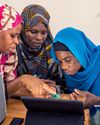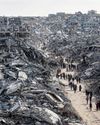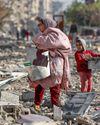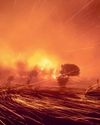
In the Amazon states of southern Colombia, patches of cattle pasture suddenly give way to trees so numerous and densely packed that the blots of emerald, lime green and white overlap as vines, leaves and tree trunks merge into one.
According to official figures, this place is a success story: the frontline of the country's fight against deforestation, which it slashed last year by 36%.
But for those who live here, the future of the forest hangs in the balance. Many believe it will be decided on the whim of a violent militia leader, who last year became one of the world's most unlikely forest protectors.
"Only one man controls these regions: Ivan Mordisco," said Miguel Tabares, who was displaced from Guaviare state when rebels threatened his life and murdered a colleague running an ecotourism project. "He is the one who is really in charge. And he does whatever the hell he wants."
Néstor Gregorio Vera Fernández - better known as Ivan Mordisco - is the leader of the Central General Staff (EMC), one of the largest armed groups in Colombia.
A list of alleged crimes, including drug trafficking, the mass killing of civilians and the forced recruitment of children, have earned him a place on the US terrorist list and made him one of Colombia's top military targets.
He also became one of the Amazon's most unexpected protectors after implementing a total ban on deforestation, and policing it with deadly force.
This story is from the November 01, 2024 edition of The Guardian Weekly.
Start your 7-day Magzter GOLD free trial to access thousands of curated premium stories, and 9,000+ magazines and newspapers.
Already a subscriber ? Sign In
This story is from the November 01, 2024 edition of The Guardian Weekly.
Start your 7-day Magzter GOLD free trial to access thousands of curated premium stories, and 9,000+ magazines and newspapers.
Already a subscriber? Sign In

Power play The Solar Mamas who are lighting up Zanzibar
In a dimly lit corridor of a mudwalled house nestled among coconut trees, Sharifa Hussein stripped red and black cables, a screwdriver voltage tester balanced between her lips and rolls of cable lying by her feet.

Play it again and again
Spotify's Billions Club tracks the world's most popular songs, but many greats are nowhere to be found. What are the forces shaping pop's new canon?

David Lynch 1946 -2025
The maverick American surrealist film director sustained a successful mainstream career while also probing the bizarre, the radical and the experimental

Election fever grows ....but Trump is pulling the strings
The machinations of Elon Musk andthe returning US president loom large in minds of politicians and voters

International response America's allies hope for the best-but prepare for the worst
Western allies of the US are braced for the return of Donald Trump, still hoping for the best, but largely unprepared for what may prove to be a chaotic and disorientating worst.

Mood music
Listening to, or playing, the right song can soothe pain, lift depression and help treat conditions as diverse as Parkinson's, Alzheimer's, PTSD and back pain. Neuroscientist and bestselling author Daniel Levitin gives his musical recommendations for better health, drawing on his experience of helping his friend, the legendary songwriter Joni Mitchell.

Gaza's devastation The terrible price exacted by Israel for 7 October attack
Israel began bombing Gaza on 7 October 2023 after Hamas crossed the border, killed about 1,200 people and took 251 others hostage to Gaza.
North Koreans' capture sheds new light on war
The news was sensational.

Fragile truce An agreement is in place-if it will hold matter is another
The hours-long delay in implementing the Gaza ceasefire agreement last Sunday was not a good omen for a deal that many fear could be doomed to failure as it moves through its challenging three phases.

Why did LA's wildfires explode out of control?
Acombustible combination of factors laid the groundwork for disaster as the city struggled with catastrophic blazes